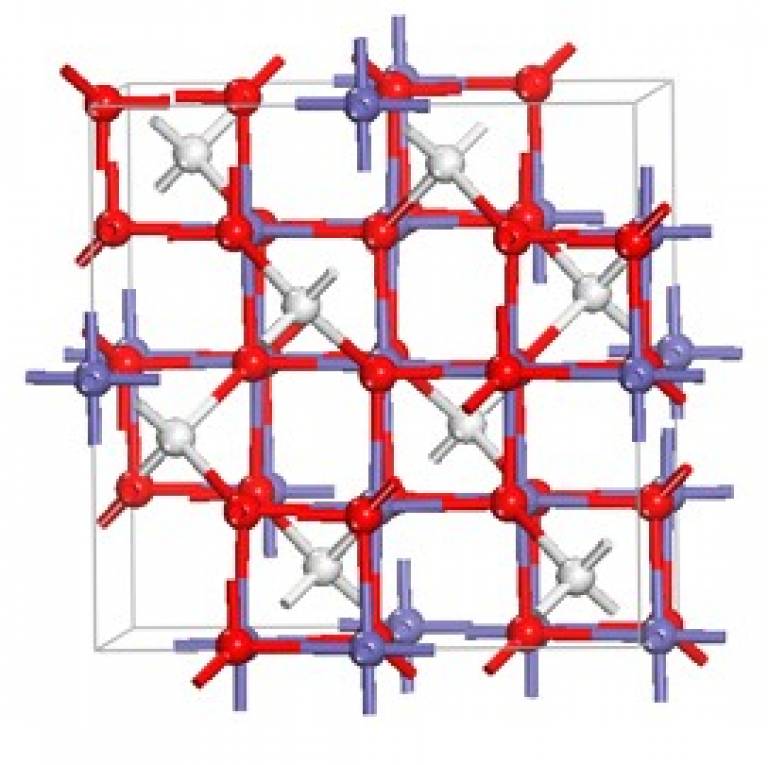Nanotechnology grants to convert carbon dioxide by emulating nature
30 March 2010
Links
 ucl.ac.uk/chemistry/staff/academic_pages/nora_deleeuw" target="_self">Professor Nora de Leeuw
ucl.ac.uk/chemistry/staff/academic_pages/nora_deleeuw" target="_self">Professor Nora de Leeuw
UCL is involved in two new nanotechnology projects that seek to turn carbon dioxide into useful products.
Professor Nora De Leeuw (UCL Chemistry) has won £1.1 million from the Engineering and Physical Sciences Research Council (EPSRC) to lead a project that aims to produce a catalytic reactor that can convert carbon dioxide into useful chemicals for applications such as fuel cells in laptops and mobile phones, by mimicking biological systems.
The project is a collaboration between the UCL Departments of Chemistry, Chemical Engineering and Science & Technology Studies, and chemicals company Johnson Matthey.
The team will build on their wide-ranging expertise
to design and produce a prototype device that will apply novel iron-nickel-sulfide nano-catalysts
for the activation and chemical modification of carbon dioxide at low voltages
obtainable from solar energy.
The team's design will take
inspiration from biological systems that can carry out complex processes
to convert carbon dioxide into biological material, and will exploit a
wide range of computational and experimental chemistry techniques.
Professor Richard Catlow, Dean of the UCL Faculty of Maths and Physical Sciences and Co-investigator on the project, said: "This is an exciting and important project which will develop new ways of activating carbon dioxide. It is a crossdisciplinary collaboration which will exploit UCL's expertise in synthesis, computation, nanoscience. electrochemistry, high-throughput techniques and chemical engineering."
Professor De Leeuw said: "If we were able to emulate
nature and convert carbon dioxide into useful products without having to use large
amounts of energy, the benefits would be enormous. One of the major
gases responsible for climate change would become an important raw
material for the chemical and pharmaceutical industries.
"It is the crossdisciplinarity which will make this project happen. Increasingly researchers have to cross boundaries between disciplines to draw together the variety of expertise required for an integrated project like this. One other important aspect of our project is the involvement of the UCL Department of Science & Technology Studies, who will advise on the ethical and societal impact of the research and organise workshops in these aspects for our researchers, policymakers and the general public."
Dr Janwang Tang (UCL Chemical Engineering) is the UCL lead on another EPSRC project, worth £1.7 million and led by Imperial, that seeks to reduce carbon
dioxide with hydrogen, electrical energy or photon energy to produce
vehicle fuels.
This team will develop nanostructured
catalysts that operate using solar or other renewable energy inputs.
These will be used in a process that mimics carbon dioxide activation in
nature - an 'artificial leaf' concept - that effectively reverses the
polluting process of burning fossil fuels. The team will collaborate
with industrial partners Millennium Inorganic Chemicals, building solutions specialist Cemex, Johnson
Matthey and the energy company E.ON.
The grants are two of a total of three awarded under the EPSRC's third Grand
Challenges call on Nanotechnology: Solutions for the Environment. The EPSRC hopes that the research will benefit a range of UK industries including companies that emit carbon dioxide in significant quantities, such as power suppliers, steel and aluminium manufacturers, fuel companies and fuel users.
The grant wins build on UCL's success in 2009, when the university won four grants worth over £5 million from the EPSRC to support research into large-scale integrated projects that exploit nanotechnology for healthcare purposes.
The film below shows the progress made by Dr Rachel McKendry (London Centre for Nanotechnology), who won £1.6 million in 2009 from the EPSRC to fund UCL's role in a world-leading consortium to engineer and commercialise the next generation of multi-marker HIV smart chips, with the aim of rapidly diagnosing and monitoring HIV in resource-limited environments such as district hospitals, GP surgeries and developing countries.
Image: Greigite: a contemporary sulfide mineral and potential catalyst for carbon dioxide activation and conversion
UCL context
The London Centre for Nanotechnology is a multidisciplinary research centre run by UCL and Imperial College London that aims to provide the nanoscience and nanotechnology needed to solve major problems in information processing, healthcare, and energy and the environment.
Related news
£5million for nanotechnology healthcare research
UCL spin-off showcases pioneering device to breast cancer surgeons
 Close
Close

